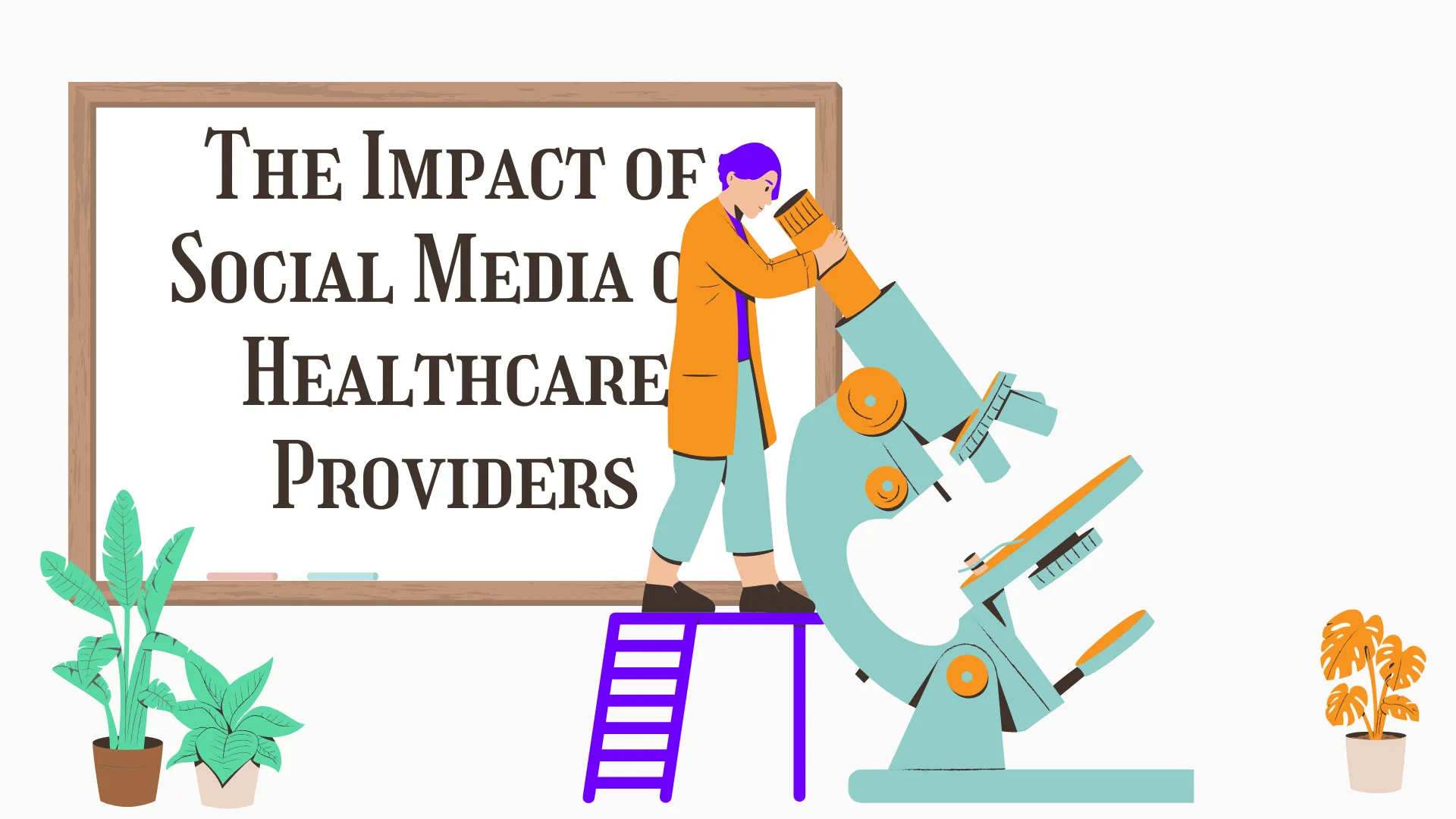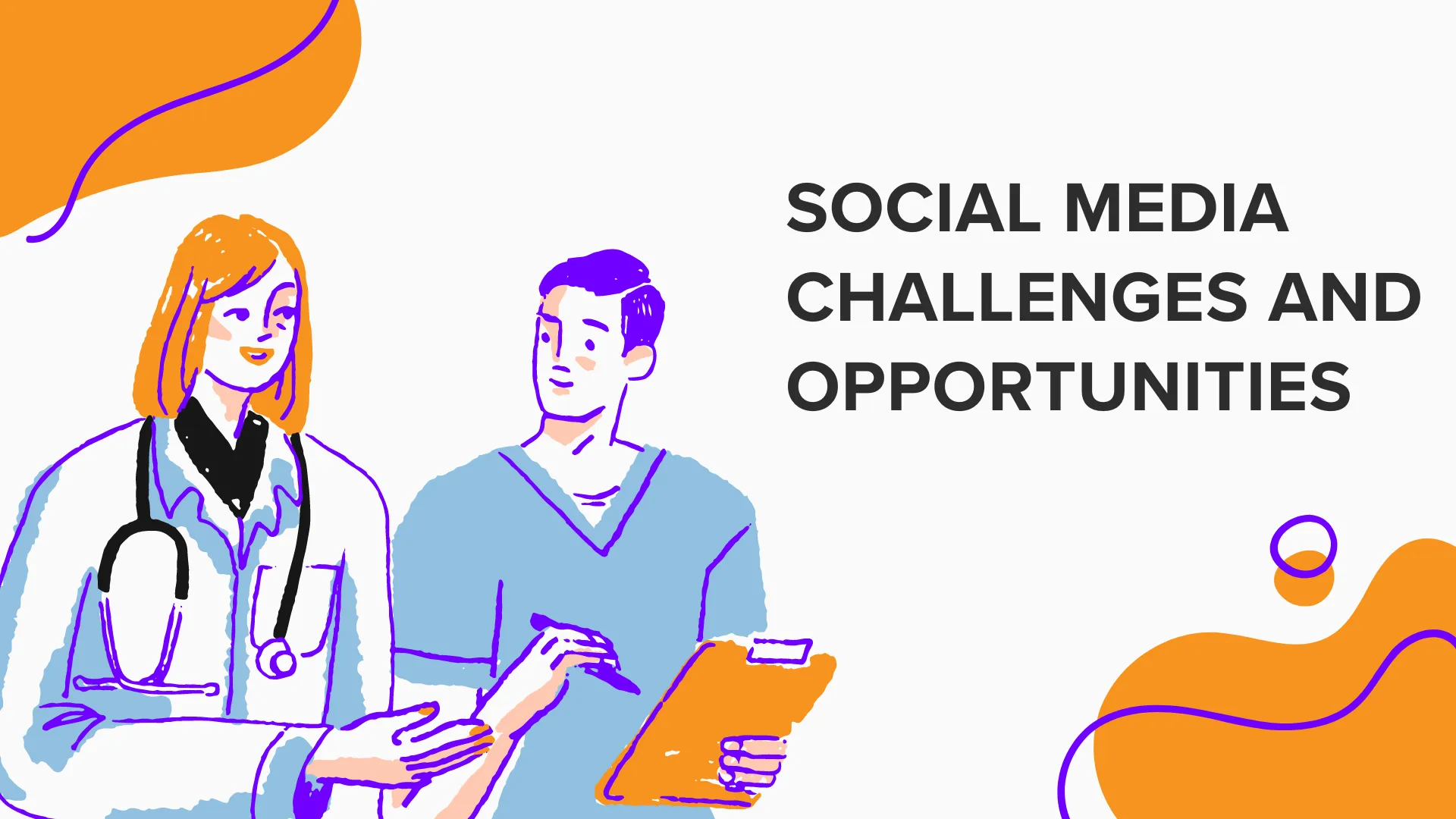Best Practices for Implementing Social Media Tools in Health Marketing
Recent studies show that the average person spends approximately 2 hours and 31 minutes on social media daily. For healthcare professionals, this time spent online offers a great chance to reach and interact meaningfully with patients. Doctors may strengthen patient relationships, promote health behaviors, and establish a supportive community for discussion and criticism by wisely using social media. Therefore, health care social media marketing has a huge impact on the medical profession.
Connecting with Patients: The Impact of Social Media on Healthcare Providers
Healthcare providers must adjust their marketing methods as patients increasingly use online platforms for health information and support. Social media’s participatory nature stimulates patient-provider conversation, which builds trust and strengthens the connection.
Organizations can build patient communities, offer health resources, and counter misconceptions by using social media. Although it may take some time, social media adoption is worth the effort.
 Current Trends in Social Media for Health Marketing
Current Trends in Social Media for Health Marketing
TikTok and Instagram Reels have transformed how healthcare brands communicate, favoring short, entertaining videos. Additional emphasis on personalized and interactive content deepens audience engagement. Artificial intelligence and chatbots are also popular for user engagement and quick responses. Here are a few best practices for implementing social media tools for health marketing:
- Health Influencers
Collaboration with health and wellness influencers broadens audiences and provides credibility to health messaging.
- User-Generated Content
Patient testimonials and experiences provide authentic insights and community trust.
- Short-Form Video Content
TikTok and Instagram Reels favor short, catchy videos that allow healthcare brands to deliver information dynamically.
- Personalization
Customizing material for specific audiences boosts social media presence and connection, improving patient relationships.
- Real-time communication
Live Q&A sessions, health presentations, and webinars allow audiences to provide rapid input and discussion.
- Social Listening
Monitoring health-related social media conversations and comments helps identify patient needs and provide proactive communication.
- Data-Driven Strategies
Analytics influence content creation, audience targeting, and strategy, ensuring health marketing aligns with audience preferences and behaviors.
Guiding Social Media: Challenges and Opportunities for Healthcare Providers
Health care social media marketing must handle misinformation and maintain credibility on social platforms, despite its benefits. Maintaining patient confidentiality requires navigating privacy issues and regulatory compliance.

Potential risks medical practices could run across on social media:
- Misinformation: The rapid spread of false information can damage public trust and confuse health issues.
- Compliance with regulations: Protecting patient privacy requires careful navigation of laws and regulations like HIPAA.
- Establishing authority and trust in a crowded digital world can be tough, especially with so much content online.
-
Content strategy and creation: Developing a content strategy and creating medical-compliant, content requires significant effort, creativity, and expertise to ensure it resonates with the target audience while adhering to regulatory standards.
- Analytics comprehension: Non-data-driven decision-makers struggle to use social media metrics for planning.
- Resource Limits: Limited manpower and budget can make social media programs difficult to establish and run.
- Negative Feedback: Handling public criticism or evaluations can be difficult and may require strategic replies to retain a positive image.
- Balance Professionalism and Engagement: Online conversations can be difficult to balance between professionalism and approachability.
Healthcare businesses may overcome these hurdles and maximize patient involvement and education with SMM by using it effectively and following best practices for healthcare social media engagement.
Developing a Social Media Strategy for Health Marketing
Health marketing campaigns need clear goals. Brand awareness, health education, patient participation, and community building may be goals. Healthcare organizations can create targeted strategies and measure their progress by setting clear goals.
How to Implement Social Media in Healthcare: Best Tips
Healthcare professionals benefit from social media because timely information improves health outcomes and patient experiences.
How then do you begin using social media to advertise healthcare products? Here are a few suggestions:
- Determine Goals
Determine your social media goals, such as patient engagement, health knowledge, or brand exposure.
- Select Platforms
Choose social media channels that match your target audience and health marketing goals. Popular platforms include Facebook, Twitter, Instagram, and LinkedIn.
- Content Strategy
Create a content calendar with instructional articles, patient testimonials, infographics, and interactive pieces. Provide value to your viewers.
- Talk to Your Audience
Monitor comments and messages to answer quickly and chat. Support, answer questions, and discuss with patients to create relationships.
- Visual Content
Use photos, videos, and live feeds to create interesting content. Visuals are more shared, can explain complex health facts, and raise public health awareness.
- Monitor and Analyze Performance
Use analytics tools to track your social media performance and learn what material your audience likes. Adjust your plan accordingly.
- Stay Current
Keep up with social media algorithm adjustments to keep your posts current and effective. These developments may need you to change your strategy.
- Ensure Compliance
To protect patient privacy and ensure your material is legal, learn about healthcare marketing requirements like HIPAA.
Balancing Engagement and Compliance in Healthcare and Wellness Content Strategy
As content is an essential part of any social interaction, social media strategies for healthcare marketing are impossible without it. Consistently producing valuable content helps establish a brand’s social media presence, making it more recognizable to potential customers and driving traffic to the website. Healthcare companies can establish themselves as market leaders by delivering authoritative and informative content and gaining client trust.

Social media content strategies for healthcare professionals:
- Sharing Patient Stories
Genuine patient experiences humanize the brand and emotionally connect with new patients.
- Health Tips
Regular medical advice pieces build credibility and provide shareable content.
- Wellness Challenges
Hosting community health challenges to encourage healthy living and participation.
- Behind-the-Scenes Content
Showing patients the hospital’s daily operations humanizes the brand and fosters trust.
- FAQs & Myth-Busting
Answering frequently asked questions and dispelling health myths builds trust and clarifies misunderstandings.
- Seasonal information
Writing about flu prevention in winter or allergy tips in spring keeps information current.
It’s difficult to identify the best practice for implementing social media tools for health marketing because all of these tools will help you rule social media. For your company, pick the most suitable ones and mix them to get the greatest outcomes.
Strategies for Growing Wellness Community on Social Media
An online community for a medical brand requires numerous effective methods that build connection and involvement. Collaborating with health influencers and medical bloggers with a large credibility is important. These agreements can boost the hospital’s social media presence and patient trust. Influencers who promote vital services or health suggestions can develop realistic, audience-relevant material that shows real-life health applications.
Content marketing helps build a medical brand community across social media platforms. It stimulates discourse by asking questions, inviting feedback, and facilitating discussions through comments and social sharing. Community members feel loyal and connected with this engaged approach.
Social media marketing tips for health and wellness brands for building community:
- Regular updates and conversations keep community members informed about brand activities and health news.
- Contests and gifts can attract new members and reward existing ones.
- A safe place for health discussions fosters community trust and transparency.
- Personalizing or specializing material for certain audiences can boost relatability and community bonds.
-
Seeking and using community input shows that their ideas matter and improve the brand.
Finding the Perfect Social Media Fit for Healthcare and Wellness Brands
Many social media sites have different uses in health marketing. The best healthcare platforms for social media marketing are the following:
With its broad readership and capacity to interact with a varied audience via postings, groups, and targeted ads, Facebook is still among the most often used tools for healthcare marketing.
Is perfect for presenting initiatives, patient tales, and health advice since its visually-driven material lets healthcare companies upload attractive photographs and videos.
Allows quick communication and the exchange of critical health information by tweets and threads, therefore helping with timely updates and direct interaction with patients and experts.
Great for linking with medical experts, distributing research, and developing B2B ties in the medical field — professional networking.
- YouTube
Leading video-sharing network YouTube offers chances for in-depth instructional videos, tutorials, and webinars, thus appealing to viewers ready for health-related knowledge.
- TikTok
Rising as a potent venue for younger audiences, TikTok lets creative and engaging content reach viewers and raise awareness.
Monitoring and Measuring Social Media Success: Tools and Features
Platform analytics like Facebook Insights and Twitter Analytics can help understand audience behavior. Third-party technologies can analyze data for informed decision-making.
Targeted ads help reach certain audiences. Effective budgeting and ad spend optimization can boost results.

Ad-monitoring tools for health organizations:
-
Facebook Ads Manager: Monitors and analyzes key performance indicators such as engagement, conversion metrics, and overall effectiveness of Facebook.
- Sprout Social tracks interaction, audience growth, and ad success across platforms via social media analytics.
- AdEspresso: A simple platform for A/B testing Facebook and Instagram advertising and offering performance insights and optimization ideas.
- Hootsuite: Manages several social media accounts and ad performance from a single dashboard.
Content scheduling and automation platforms may streamline marketing while balancing automation with personalized interactions to boost engagement.
Automation and scheduling tools to manage social media:
- Buffer: Easy content scheduling and analytics for post-interaction and reach.
- Later: Schedules visual material for Instagram, letting users plan and evaluate feeds before posting.
Sprout Social: Improves social media strategy with powerful scheduling, analytics, and social listening. - CoSchedule: Simplifies marketing process with social media scheduling and content marketing tools.
- SocialBee: Categorizes evergreen material and tracks engagement via analytics.
- MeetEdgar repeats top-performing material on social media to maintain engagement.
Analytical data reveals a lot about how successful the work in social media was and how to improve it, making social media management for healthcare businesses an essential part. Ignorance of analytics and planning tools will not help your healthcare company ensure successful social media expansion.
Key Insights for Effective Social Media Use in Health Marketing
Leveraging effective social platforms in health care social media marketing requires a multifaceted approach, emphasizing audience engagement, targeted content strategies, clear goals, and continuous assessment. Healthcare marketers must adapt to digital advances and stay responsive to emerging trends. Webugol specializes in helping healthcare companies navigate these challenges by developing custom strategies that balance experimentation with compliance, all within ethical and regulatory boundaries. Through Webugol’s expertise, businesses can achieve marketing success while building trust with their audiences.


